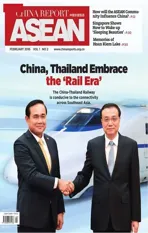AIIB Formally Established in Beijing
2016-09-26
AIIB Formally Established in Beijing

Chinese President Xi Jinping attended the opening ceremony of the Asian Infrastructure Investment Bank, and unveiled the landmark of“turn stone into gold by touching”.
The opening ceremony of the Asian Infrastructure Investment Bank(AIIB) was held in Beijing on January 23, with Chinese President Xi Jinping in attendance.
“This is a historical moment,” he said in an address to the ceremony held in the Diaoyutai State Guesthouse in Beijing.
When addressing the inaugural meeting of the AIIB Board of Governors on January 16, Chinese Premier Li Keqiang elaborated on his vision for the new multilateral development bank and the Chinese economy in 2016.
He said China expects to see “the AIIB will fully draw on the useful experience of existing multilateral development institutions, well identify its own role and cultivate its unique features.”
AIIB was formally established in Beijing on December 25, 2015. Headquartered in Beijing, it now has 57 members.
Chinese Finance Minister Lou Jiwei was elected as the first Chairman of the AIIB Council, while Jin Liqun was elected the frst AIIB president.
“Te establishment of the AIIB marks a milestone in the reform of global economic governance system,” Lou said.
The AIIB became operational after the board of directors and executive council met for the first time. The meetings were held from January 16 to 18 in Beijing, according to Lou. The bank's president was ofcially appointed along with the management team.
The bank will start recruiting new members, Jin Liqun, the bank's president, said in an interview with the Xinhua News Agency, adding that members of the International Bank for Reconstruction and Development and the Asian Development Bank (ADB) could apply to join the AIIB.
The bank will always be open to new membership, he stressed.
The Articles of Agreement outline the fnancial share of each founding member as well as rules for policy-making, governance structure, and business and operational systems for the bank. It became efective once the legislatures of 17 members, who hold a combined 50.1 percent stake in the bank,ratifed the agreement.
As long as at least 10 signatories, and no less than 50 percent of the capital contribution, obtain legislative approval, the agreement will become efective.
China, India and Russia are the three largest shareholders, taking a 30.34 percent,8.52 percent, 6.66 percent st-ake, respectively. Teir voting shares are calculated at 26.06 percent, 7.5 percent and 5.92 percent.
“China is not deliberately seeking a veto power,” China's Vice Finance Minister Shi Yaobin said in an intervie-w with Xinhua. He went on to say that China's stake and voting share in the initial stage are the “natural outcome” of current rules, and may be diluted as mor-e members join.
As its name suggests, the AIIB will fnance infrastructure in Asia, such as airports, mobile phone towers, railways and roads.
Tere is a yawning infrastructure funding gap in Asia, which has been flled until now largely by the ADB with about US$8 trillion from 2010.
While both the ADB and World Bank focus on a broad range of development programs including agriculture, education and gender equality, the AIIB will concentrate on infrastructure alone. The International Monetary Fund, World Bank and ADB have all welcomed the AIIB initiative and see room for collaboration.
With authorized capital of US$100 billion, the AIIB will initially prioritize investment in energy, power generation,transportation, rural infrastructure, environmental protection and logistics. It is expected to ofer loans to the frst batch of projects in mid-2016.
(Source: Xinhua News Agency)
